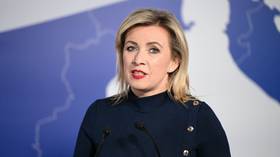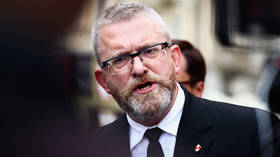ROAR: Moldovan PM hopes for “principal talk” with Russian counterpart

Only serious geopolitical shifts in the region may change the situation with the Transdniester Republic, analysts believe.
Moldovan Prime Minister Vlad Filat has said that Chisinau will pursue “a policy of dignity” in relations with Russia. He urged Moscow to respect Moldova’s sovereignty and “to end direct and indirect support” for the breakaway Transdniester Moldovan Republic.
The population of Transdniester proclaimed independence in 1990 in response to Chisinau’s nationalistic policies. The Republic of Moldova, which was proclaimed in August 1991, some months before the breakup of the Soviet Union, sent troops to Transdniester in summer 1992. A full-scale war was prevented thanks to Russian peacekeepers. Since then, peacekeeping troops from Transdniester, Russia and Moldova have been securing the stability in the region.Filat told the Romanian newspaper Adevarul that he was hoping to conduct “a principle talk” with Russian Prime Minister Vladimir Putin “to solve the Transdniester conflict.” The negotiations may take place on the sidelines of the meeting of the heads of the CIS states’ governments in Yalta on 20 November.
The Moldovan prime minister has also turned down proposals of some Romanian politicians “to abandon Transdniester in exchange for the accelerated joining the European Union.” Moldova is an independent and unified state, and it is necessary to work much “to return [the region’s capital Tiraspol] to the Moldovan constitutional field,” he said.
Filat also said that “the current situation does not justify the presence of the military, especially from a country that had been involved in the conflict.”
The leader of the Transdniester Republic, Igor Smirnov, said in October that his region was ready to join Russia. Almost all the voters of the breakaway republic who took part in the referendum in 2006 supported the eventual accession of Transdniester to the Russian Federation.
The Transdniester Republic “will observe with interest” the meeting between the Russian and Moldovan prime ministers, Vladimir Yastrebchak, foreign policy head of the breakaway region, said. He explained this by the fact that Moscow has a clear position, Novy Region news agency said. Apart from the Transdniester problems, Chisinau has many other issues to discuss with Russia, Yastrebchak added.
“Russia has not officially recognized the Transdniester Republic,” Lenta.ru website said, adding that Russian troops “remain in the region despite Chisinau’s protests.” The troops have been stationed as peacekeepers since 1992.
Moldova’s leadership and opposition have demanded that the troops be withdrawn, citing the neutral status of the country, stated in the constitution, the website said. The status bans the republic from having foreign troops on its territory. However, now the stability in the region is being secured by peacekeepers from Russia, Moldova, Transdniester and observers from Ukraine.
New leadership that came to power in Moldova has already raised the issue of the Russian troops. Mihai Gimpu, the speaker of the parliament and the acting president, discussed the problem at a recent meeting with the head of the Russian presidential administration Sergey Naryshkin. “At the same time, Gimpu expressed the opinion that Chisinau’s intentions will not deteriorate relations with Moscow,” Lenta.ru said.
However, the problem is that the authorities in Moldova do not take Tiraspol’s position into consideration, many analysts say. The Moldovan leadership “has traditionally demanded the withdrawal of the Russian peacekeepers from Transdniester,” said Mikhail Neizhmakov, head of the Center for International Politics at the Institute of Globalization and Social Movements.
“Russia is unlikely to withdraw its peacekeepers from the region in the near future, and Chisinau’s abilities to exert pressure on Moscow are extremely limited,” Neizhmakov told Kommentarii.ru website. He explained the statements of the new Moldovan leadership by their intention “to remind themselves to the partners from the European Union.”
“Interestingly, such statements of Vlad Filat, Mihai Gimpu and their entourage may only strengthen Russia’s attention to their partner in the coalition, [presidential candidate] Marian Lupu,” Neizhmakov said. Lupu has already declared opposition to Moldova’s joining NATO and the readiness to hold constructive dialogue on Transdniester problem, he added.
In the short-term perspective the status-quo may be preserved due to the political instability in Moldova, the analyst said. He also doubted that the situation will lead to “a civilized divorce” with the official recognition of Transdniester’s independence or a new integration of Moldova and its breakaway republic.
The possibility of the recognition of Transdniester by other countries or the republic’s accession to Russia is also too weak, Neizhmakov said. Only serious geopolitical changes in the region may really influence the situation, he said, referring to “integration efforts” in Romania and Moldova.
“Much depends on Ukraine’s position and its abilities,” he said. “Taking into account the orientation of the current Moldovan leadership to Romania and complicated relations between Kiev and Bucharest, Ukraine’s position may become well-disposed towards Transdniester,” he added.
At the same time, some analysts stress that Bucharest may be interested only in reunification with “former Bessarabia” without Transdniester. “Romanian politicians would be glad to reunite Bessarabia, but they are indifferent to such value as the ‘territorial integrity of Moldova,’” political scientist Sergey Markedonov said.
“On the contrary, opponents [in Moldova] of the union with Romania are insisting on the settlement of the Transdniester problem and ‘the unification’ of the two banks of the Dniestr River rather than the Prut River,” Markedonov wrote on Novaya Politika website.
“The policies of the Moldovan authorities have been determined… by [the country’s] geographical position between Romania and Ukraine,” Aleksey Martynov, director of the International Institute of the Newly Established States, believes. “The Russian factor is taken into consideration,” he added.
“There are 140,000 Russian citizens in Transdniester, or almost 30% of the republic’s population,” Martynov told Regnum news agency. He wondered what “Filat wants to get from the Russian authorities.” Maybe he wants Russia “to leave and forget its 140,000 citizens, or make it possible to eliminate them by withdrawing the troops,” the analyst assumed.
“Or should Putin personally order the captains of Russian business to abandon their assets in Transdniester for Filat and his friends?” Martynov asked, adding that this “will never be the case.”
“The young Moldovan prime minister is bluffing before senior friends in Bucharest,” Martynov said. “It is not ruled out that after such statements Putin will not wish to meet his Moldovan counterpart,” he added.
The former Russian president has not forgotten the situation in 2003 when “after unprecedented Russian efforts to ultimately solve the Transdniester issue, some hours before the ceremony and Putin’s official visit to Chisinau, the settlement was disrupted,” Martynov said.
Filat and his current partners in the coalition were among those who “publicly opposed the final solution to the Transdniester issue in 2003,” Martynov said. If the Moldovan prime minister relies on the dialogue with Putin, he “should begin with his personal and official apologies,” the analyst added.
Sergey Borisov, RT













